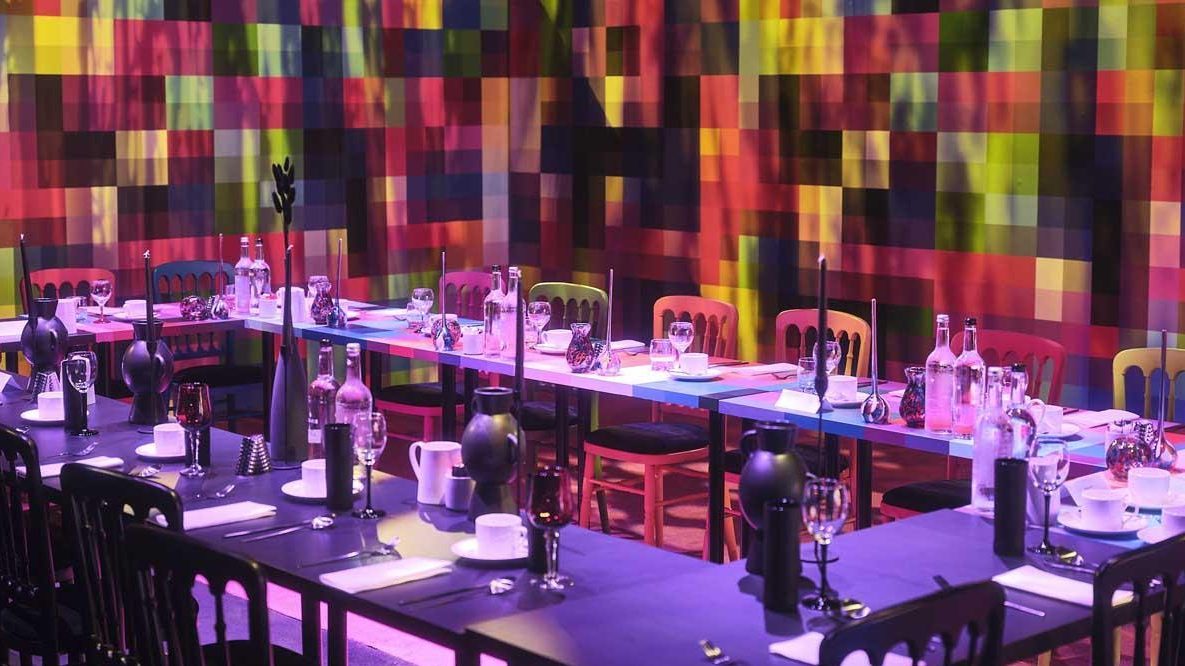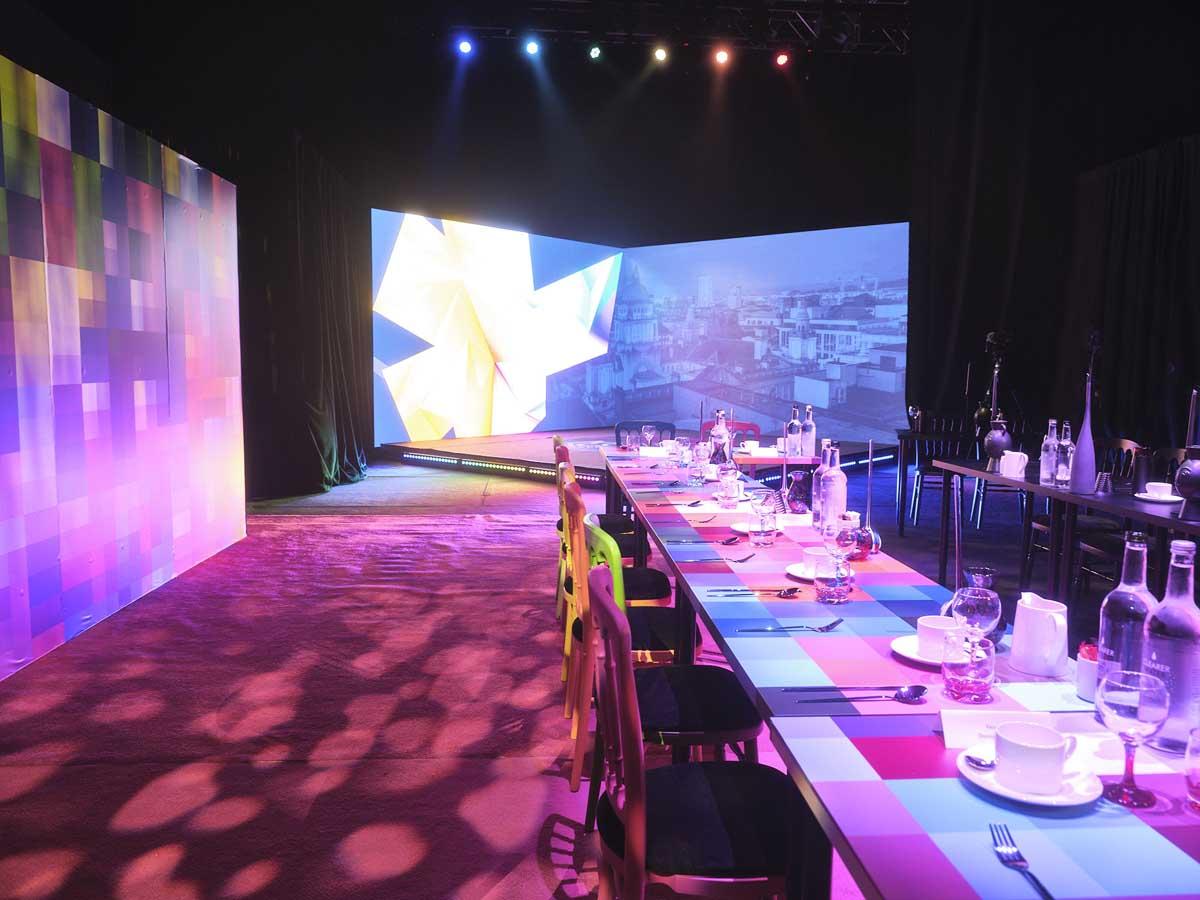ICC Belfast partnered with Belfast City Council and Northern Ireland Chamber of Commerce and Industry.
Engage, Attract, Grow was a one-off roundtable discussion dedicated to exploring networking and communication in a hybrid world.
This event brought together an intimate group of executive leaders from leading organisations across Northern Ireland in ICC Belfast’s Hybrid Studio, which was completely transformed through a unique set up to deliver maximum impact and create a memorable experience.
- Attendees
- Hybrid
- Event Type
- Hybrid
- Space Used
- Studio
Upon arrival, delegates entered a ‘hybrid wonderland’. The multi-coloured, digital pixel themed backdrop, created by ICC Belfast’s event production partners, Rebel Events NI, truly pushed the boundaries of a regular round table lunch. In a hybrid world, thinking outside the box is key when hosting a standout event, and room dressing plays an integral role in creating an environment in which creativity can flourish and a sense of thrill is created that stays with delegates long after the closing remarks.

Once seated around the stunning centrepiece table, delegates enjoyed a delicious Taste of Ulster lunch, crafted by our in-house catering partners, sampling fresh local produce while networking with like-minded professionals in what was some delegates’ first in-person meet-up since March 2020.
The roundtable discussion kicked off with our co-hosts Suzanne Wylie, Past Chief Executive Belfast City Council, Ann McGregor MBE DL, Chief Executive NI Chamber and Ellvena Graham OBE FIoD, Past Chairman of ICC Belfast | Waterfront Hall | Ulster Hall opening the floor and posing the question:
"How do we grow our networks and businesses in a hybrid world, and bring business back to Belfast?"

As expected, online platforms such as hybrid events and conferences, in addition to social media platforms such as LinkedIn, were cited as the most popular virtual networking tools. However, as the city reopens and thrives once again, we are seeing a return to face-to-face meetings and in-person events. Delegates agreed that while virtual networking works well on occasion, in-person interaction cannot be replaced entirely, as it allows for a richer and more engaging conversation.
The key is being authentic and genuine in your approach to building a network and to consider your strategy in how to create a purposeful connection.
Additionally, delegates agreed that face to face communication is vital for business growth, particularly for smaller business who rely on building strong connections with clients. Many businesses have chosen to adapt their client communications to work in a hybrid world. They now utilise video platforms such as Zoom / Microsoft Teams to maintain relationships and develop new ones, adapting their service offering to a format that allows their clients to be communicated to in a way and place that suits their needs.
How should we engage with employees?
Prior to the pandemic, lunch and learns, team building days and happy hours were a regular occurrence within many organisations. However, as workforces adopted exclusive remote working overnight, employers had to quickly adapt and offer a virtual alternative. Many delegates noted that despite having to remain apart, their workforces became closer knit as they trialled new or additional internal communications tools to maintain engagement such as virtual events, intranets, newsletters and incentive programmes.
The need for a strong employer brand was also identified as a key means to overcoming the challenges associated with attracting and retaining top talent. Furthermore, the rise of remote working allows geographically diverse work forces to come together as and when required to experience quality team building events at which they feel a true sense of belonging.
While all agreed that regular communication is integral to employee engagement, two factors stood out to ensure it was impactful. These were the authenticity of all communications and ensuring the ability for two-way communication amongst the team. Additionally, it was noted that it is imperative the right content is shared, which was viewed as being much more important than the individual delivering it.
We must create a sense of belonging in a hybrid world.
Over recent months, organisations such as ICC Belfast have invested in hybrid technology to enable businesses to deliver incredible hybrid events. For example, in September 2021, ICC Belfast delivered EABCT’s Annual Congress, their first fully hybrid, large-scale event to an audience of over 2000+ people.
A hybrid format allowed EABCT to expand the reach of their congress and provided a cost-effective way to engage members for whom travel was not financially viable. However, it was the charm and character of Belfast that made this event one to remember as many colleagues joyfully reunited to debate and collaborate in person for the first time in two years.

Many working relationships and friendships are built in the office as it provides the opportunity for those ’water cooler’ moments that aren’t as easily replicated in a virtual capacity. Whilst there’s no one size fits all approach, hybrid solutions allow organisations the chance to find the right balance for their team and be inclusive of everyone’s individual needs.
Is hybrid working the future?
As we welcome business back to Belfast, it is imperative that organisations take the time to establish their ‘Future of Work’ plans, providing clear communication on their approach to hybrid working. The potential for presenteeism in the office was highlighted as well as the potentially negative impacts of re-introducing office working too quickly now that new routines and ways of life are embedded.
Moving back to face to face working is very important, particularly for staff development and spaces like this at ICC Belfast are so important to make that possible.
Overall, hybrid working has showcased the importance of flexibility. Time spent in the office and indeed at events should add value and provide opportunities for team collaboration and innovation, giving employees a sense of belonging within the organisation.
Whilst virtual alternatives and remote working may have their benefits, in-person networking and communication are still as important as ever. Where you can, make those in-person events and meet-ups memorable and use them as an opportunity to create an emotional connection, which in turn, will set any organisation up for success whether the goal is to build a network, attract and retain top talent or become an industry leader.

